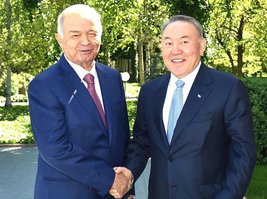TASHKENT -- A push is under way to have residents of Uzbekistan attain fluency in Uzbek, if they have not already.
Studying Uzbek will enable young men and women learn to think independently and reject extremism, the government hopes.
The move comes as Uzbekistan tries to stop the exodus of radicalised citizens to wars in Syria and Iraq, which numbers in the hundreds since 2011.
At the same time, the government has to cope with the diversity of a population in which Uzbek is not everybody's first language, as well as with the legacy of Soviet rule, when the urban, educated class spoke better Russian than Uzbek.
A diverse nation
In Uzbekistan, diversity makes universal fluency in Uzbek a challenge, but the country's many ethnic groups co-exist in peace.
"People from more than 140 ethnic groups live here," Khan said. "Uzbek is the official language. But not everyone has to use it ... Other languages like Russian are permitted in official documents."
"Many countries could follow Uzbekistan's example," Tashkent college student Otabek Sultankhojayev told Central Asia Online. "[Uzbek citizens] communicate freely with each other in their own languages. This is particularly important, given the statements of various extremists trying to create rifts among Central Asian countries."
A new university
Hoping to increase nationwide fluency in Uzbek, President Islam Karimov in May decided to create the University of Uzbek Language and Literature.
The university is scheduled to open this September in Tashkent. Its goals include educating Uzbek youth in the spirit of patriotism and universal human values.
It will bear the name of 15th-century poet Alisher Navoi.
The university also will serve as outreach to the numerous Uzbek speakers throughout nearby countries in hopes of strengthening regional stability and mutual understanding.
Some of those ethnic Uzbeks from various countries are fighting in Syria as members of the Imam Bukhari Jamaat, while others within the Islamic Movement of Uzbekistan (IMU) are fighting in Pakistan and Afghanistan.
"About 2.8m Uzbek speakers live in Tajikistan, Kyrgyzstan, Kazakhstan and Turkmenistan, according to the Uzbek government," Tashkent political scientist Valerii Khan told Central Asia Online.
"Under the Afghan constitution, Uzbek is an official language in the north, where almost 3m ethnic Uzbeks live," Khan added. "This makes Uzbek second only to Russian for the number of speakers in Central Asia. Uzbek can serve as a tool for cultural co-operation and integration."
The University of Uzbek Language and Literature "will become a unified academic centre for the study of Uzbek", Higher and Secondary Specialised Education Ministry spokesman Javokhir Khatamov told Central Asia Online. "We've needed such a centre for a long time."
"A major function ... will be the education of young people in the spirit of love of of the homeland, national and universal human values, a broad world outlook and independent thinking," he said.
Public acclaim for plan to open university
The public is thrilled to have a university dedicated to the country's language.
"This should have been done long ago," Tashkent resident Aziza Jurayeva told Central Asia Online. "Our country does not produce enough [written] content."
"If you look at the Uzbek corner of the internet, you'll find many more interesting and frequently visited sites in Russian than in Uzbek," she said. "It should be possible to read more foreign books and watch more foreign films translated into Uzbek."
To popularise the reading of Uzbek-language books, the government held a book festival May 26-28 nationwide

![A girl browses through Uzbek-language books at a store in Tashkent May 20. The government hopes to encourage fluency in Uzbek nationwide. [Maksim Yeniseyev]](/cnmi_st/images/2016/06/06/5836-uz_newuniversity-585_329.jpg)







Greetings. Long live the people of Afghanistan, Tajikistan, Uzbekistan, and Iran, all of whom have a common beautiful language, i.e. Farsi. I became so interested in the aforementioned countries ever since I learned that they all share the same language. Thanks, Sadegh, from Tehran
Reply1 Comment